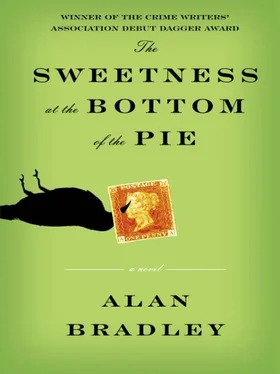Alan Bradley - The Sweetness at the Bottom of the Pie
Здесь есть возможность читать онлайн «Alan Bradley - The Sweetness at the Bottom of the Pie» весь текст электронной книги совершенно бесплатно (целиком полную версию без сокращений). В некоторых случаях можно слушать аудио, скачать через торрент в формате fb2 и присутствует краткое содержание. Жанр: Старинная литература, на английском языке. Описание произведения, (предисловие) а так же отзывы посетителей доступны на портале библиотеки ЛибКат.
- Название:The Sweetness at the Bottom of the Pie
- Автор:
- Жанр:
- Год:неизвестен
- ISBN:нет данных
- Рейтинг книги:3 / 5. Голосов: 1
-
Избранное:Добавить в избранное
- Отзывы:
-
Ваша оценка:
- 60
- 1
- 2
- 3
- 4
- 5
The Sweetness at the Bottom of the Pie: краткое содержание, описание и аннотация
Предлагаем к чтению аннотацию, описание, краткое содержание или предисловие (зависит от того, что написал сам автор книги «The Sweetness at the Bottom of the Pie»). Если вы не нашли необходимую информацию о книге — напишите в комментариях, мы постараемся отыскать её.
The Sweetness at the Bottom of the Pie — читать онлайн бесплатно полную книгу (весь текст) целиком
Ниже представлен текст книги, разбитый по страницам. Система сохранения места последней прочитанной страницы, позволяет с удобством читать онлайн бесплатно книгу «The Sweetness at the Bottom of the Pie», без необходимости каждый раз заново искать на чём Вы остановились. Поставьте закладку, и сможете в любой момент перейти на страницу, на которой закончили чтение.
Интервал:
Закладка:
I was so exasperated I could spit, and I did.
What would Marie-Anne Paulze Lavoisier have done? I wondered. Would she have stood here fuming and foaming like one of those miniature volcanoes which results when a heap of ammonium dichromate is ignited? Some how I doubted it. Marie-Anne would forget the chemistry and tackle the door.
I gave the doorknob a vicious twist and fell forward into the room. Some fool had been here and left the stupid thing unlocked! I hoped no one had been watching. Good thing I thought of that, though, since I realized at once that it would be wise to wheel Gladys inside where she wouldn't be spotted by passing busybodies.
Skirting the mouth of the boarded-over pit in the middle of the room, I eased my way gingerly round to the racks of yellowed newspapers.
I had no trouble finding the relevant issues of The Hinley Chronicle . Yes, here it was. As I thought it might, Mr. Twining's obituary had appeared on the Friday after the account of his death:
Twining, Grenville, M.A. (Oxon.) Passed away suddenly on Monday last at Greyminster School, near Hinley, at the age of seventy-two. He was predeceased by his parents, Marius and Dorothea Twining, of Winchester, Hants. He is survived by a niece, Matilda Mountjoy, of Bishop's Lacey. Mr. Twining was buried from the chapel at Greyminster, where Rev. Canon Blake-Soames, Rector of St. Tancred's, Bishop's Lacey, and Chaplain of Greyminster, led the prayers. Floral tributes were numerous.
BUT WHERE HAD THEY BURIED HIM? Had his body been returned to Winchester and laid to rest beside his parents? Had he been buried at Greyminster? Somehow I doubted it. It seemed much more likely that I would find his grave in the churchyard of St. Tancred's, no more than a two-minute walk from where I was standing.
I would leave Gladys behind in the Pit Shed; no point in attracting unnecessary attention. If I crouched down and kept behind the hedgerow that bordered the towpath, I could easily pass from here to the churchyard without being seen.
As I opened the door, a dog barked. Mrs. Fairweather, the Chairman of the Ladies' Altar Guild, was at the end of the lane with her corgi. I eased the door shut before she or the dog could spot me. I peeked out the corner of the window and watched the dog snuffling at the trunk of an oak as Mrs. Fairweather stared off into the distance, pretending she didn't know what was going on at the other end of the lead.
Blast! I'd have to wait until the dog had done its business. I looked round the room.
On either side of the door were makeshift bookcases whose rough-cut, sagging boards looked as if they'd been hammered together by a well-meaning but inept amateur carpenter.
On the right, generations of outdated reference books—year upon year of Crockford's Clerical Directory, Hazell's Annual, Whitaker's Almanack, Kelly's Directories, Brassey's Naval Annual —all jammed uncomfortably cheek-by-jowl on shelves of unpainted boards, their once regal bindings of red and blue and black now bleached brown by time and seeping daylight, and all of them smelling of mice.
The shelves on the left were filled with rows of identical gray volumes, each with the same gold-leaf title embossed on its spine in elaborate Gothic letters: The Greyminsterian; I remembered that these were the yearbooks from Father's old school. We even had a few of them at Buckshaw. I pulled one from the shelf before noticing that it was marked 1942.
I returned it to its place and ran my index finger to the left along the spines of the remaining volumes: 1930… 1925…
Here it was—1920! My hands shook as I took down the book and flipped quickly through it from back to front. Its pages overflowed with articles on cricket, rowing, athletics, scholarships, rugger, photography, and nature study. As far as I could see, there was not a word about the Magic Circle or the Stamp Society. Scattered throughout were photographs in which row upon row of boys grinned, and sometimes grimaced, at the eye of the camera.
Opposite the title page was a photographic portrait edged in black. In it, a distinguished-looking gentleman in cap and gown perched casually upon the end of a desk, Latin grammar in hand as he gazed at the photographer with a look of ever-so-slight amusement. Beneath the photo was a caption: “Grenville Twining 1848–1920.”
That was all. No mention of the events surrounding his death, no eulogy, and no fond recollections of the man. Had there been a conspiracy of silence?
There was more to this than met the eye.
I began slowly turning pages, scanning the articles and reading the photo captions wherever one was provided.
Two thirds of the way through the book my eye caught the name “de Luce.” The photograph showed three boys in shirtsleeves and school caps sitting on a lawn beside a wicker hamper which rested on a blanket littered with what appeared to be food for a picnic: a loaf of bread, a pot of jam, tarts, apples, and jars of ginger beer.
The caption read “Omar Khayyam Revisited—Greyminster's Tuck Shop Does Us Proud. Left to right: Haviland de Luce, Horace Bonepenny, and Robert Stanley pose for a tableau from the pages of the Persian Poet.”
There was no doubt that the boy on the left, cross-legged on the blanket, was Father, looking more happy and jolly and carefree than I had ever known him to be. In the center, the long, gangling lad pretending he was about to bite into a sandwich was Horace Bonepenny. I'd have recognized him even without the caption. In the photograph, his flaming red curls had registered on the film as a ghostly pale aura round his head.
I couldn't suppress a shiver as I thought of how he had looked as a corpse.
Slightly apart from his comrades, the third boy, judging by the unnatural angle at which he held his head, seemed to be taking pains to show off his best profile. He was darkly handsome and older than the other two, with a hint of the smoldering good looks of a silent movie star.
It was odd, but I had the feeling that I had seen that face before.
Suddenly I felt as if someone had dropped a lizard down my neck. Of course I had seen this face—and recently too! The third boy in the photograph was the person who only two days ago had introduced himself to me as Frank Pemberton; Frank Pemberton, who had stood with me in Buckshaw Folly in the rain; Frank Pemberton, who this very morning had told me that he was off to view a shroud tomb in Nether Eaton.
One by one the facts assembled themselves, and like Saul I saw as clearly as if the scales had been ripped from my eyes.
Frank Pemberton was Bob Stanley and Bob Stanley was “The Third Man,” so to speak. It was he who had murdered Horace Bonepenny in the cucumber patch at Buckshaw. I'd be willing to stake my life on it.
As everything fell into place my heart pounded as if it were about to burst.
There had been something fishy about Pemberton from the outset, and again this was something I had not thought about since Sunday at the Folly. It was something he had said… but what?
We had talked about the weather; we had exchanged names. He had admitted that he already knew who I was, that he had looked us up in Who's Who . Why would he need to do that when he had known Father for most of his life? Could that have been the lie that set my invisible antennae to twitching?
There had been his accent, I remembered. Slight, but still…
He had told me about his book: Pemberton's Stately Homes: A Stroll Through Time . Plausible, I suppose.
What else had he said? Nothing of any great importance, some load of twaddle about us being fellow castaways on a desert island. That we should be friends.
The bit of tinder that had been smoldering away in the back of my mind burst suddenly into flames!
Читать дальшеИнтервал:
Закладка:
Похожие книги на «The Sweetness at the Bottom of the Pie»
Представляем Вашему вниманию похожие книги на «The Sweetness at the Bottom of the Pie» списком для выбора. Мы отобрали схожую по названию и смыслу литературу в надежде предоставить читателям больше вариантов отыскать новые, интересные, ещё непрочитанные произведения.
Обсуждение, отзывы о книге «The Sweetness at the Bottom of the Pie» и просто собственные мнения читателей. Оставьте ваши комментарии, напишите, что Вы думаете о произведении, его смысле или главных героях. Укажите что конкретно понравилось, а что нет, и почему Вы так считаете.












